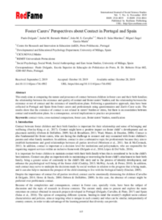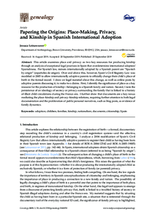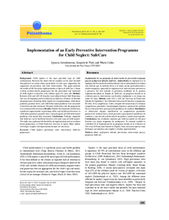Displaying 71 - 80 of 149
Join this webinar to walk through the PROMISE Child Participation Tool and to discuss approaches and considerations for soliciting children’s views on their Barnahus experience.
This study aims at comparing the nature and processes of contact between children in foster care and their birth families; the relationship between the existence and quality of contact and foster carers’ burden; and the relationship between the existence or not of contact and the existence of reunification plans.
This study had three goals: (1) To analyze the prevalence of dating violence in adolescents under residential care settings according to sex and age; (2) to explore the relationships between victimization and perpetration in adolescents’ dating violence, sexist attitudes and clinical variables; and (3) to identify variables associated to adolescents’ dating violence (victimization and perpetration).
The objective of this study was to evaluate the health status and anthropometrical development of adopted children from Ethiopia living in southern Spain.
The objective of this study was to determine if Spanish foster care children and Spanish non-foster children differ on sluggish cognitive tempo (SCT), ADHD-inattention (IN), ADHD-hyperactivity/impulsivity (HI), oppositional defiant disorder (ODD), limited prosocial emotions (LPE), anxiety, depression, social and academic impairment measures and if the duration of foster care predicts a reduction in symptom and impairment differences between foster and non-foster care children.
This article examines place and privacy as two key resources for producing kinship through an analysis of exceptional legal practices in Spain that overdetermine international adoptees’ Spanishness.
This study sought to analyze the executive functions of a sample of 43 Spanish foster children aged between five and nine years (M = 7.51, SD = 1.29), using a caregiver-reported questionnaire.
This study sought to analyze the executive functions of a sample of 43 Spanish foster children aged between five and nine years (M = 7.51, SD = 1.29), using a caregiver-reported questionnaire.
The purpose of this webinar is to shed light on the specific experiences and issues of unaccompanied and separate girls in the European Response.
This paper presents the results of the first pilot implementation in Spain of SafeCare, a home visiting evidence-based programme for the prevention and treatment of child neglect in families with children aged 0-5 years old.




